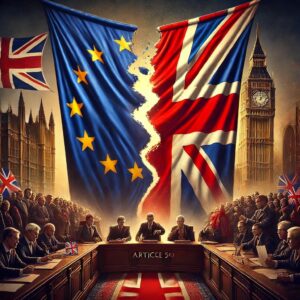On March 29, 2017, the United Kingdom made history by formally triggering Article 50 of the Treaty on European Union, setting the stage for its departure from the EU. This moment marked the beginning of a long and complex process known as Brexit, a decision that divided the nation and sent shockwaves across Europe. With a letter hand-delivered to EU officials in Brussels, Prime Minister Theresa May officially set the wheels in motion for Britain’s exit, fulfilling the outcome of the 2016 referendum. For some, it was a triumphant step toward reclaiming sovereignty; for others, it was the start of economic uncertainty and political turmoil.
The move was the result of deep-seated debates over trade, immigration, and national identity. Supporters of Brexit saw it as an opportunity to take back control of laws, borders, and economic policies, freeing the U.K. from what they saw as excessive EU bureaucracy. Opponents, however, feared the consequences—disruptions to businesses, a weakened pound, and the loss of seamless access to European markets. The immediate aftermath of invoking Article 50 saw financial markets react with volatility, businesses scrambling to prepare for new regulations, and British citizens living in the EU facing an uncertain future.
As negotiations between London and Brussels unfolded, it became clear that Brexit would not be simple. The U.K. had two years to finalize a withdrawal agreement, but disputes over trade, the Irish border, and citizens’ rights prolonged the process far beyond the initial deadline. The country experienced leadership changes, intense parliamentary battles, and even mass protests calling for a second referendum. What was meant to be a swift and decisive exit became a drawn-out saga, revealing deep political and social divisions within Britain.
Now, years after the triggering of Article 50, the effects of Brexit continue to shape the U.K.’s economy, global standing, and domestic policies. While some celebrate the newfound independence, others struggle with the realities of trade barriers, labor shortages, and diplomatic challenges. March 29, 2017, will always be remembered as the day Britain charted a new course—one filled with both opportunities and obstacles, uncertainty and promise.

